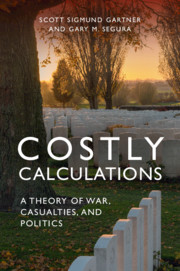Book contents
- Costly Calculations
- Costly Calculations
- Copyright page
- Dedication
- Contents
- Figures
- Tables
- Acknowledgments
- 1 Introduction
- 2 A Price Theory of War
- 3 Calculating War’s Price: What’s It Worth, and How Much Will It Cost?
- 4 The Price Theory of War in Action: Experimental Demonstrations of the Impacts of Expected Costs and Valuable War Aims
- 5 Conflict Dynamics across Space and Time: Public Opinion in the Korean and Vietnam Wars
- 6 Getting Wartime Information from Over-There to Over-Here: News Media and Social Networks
- 7 Elite Opinion Formation and Its Electoral Consequences
- 8 Conclusion: Wars, Casualties, Politics, and Policies
- Bibliography
- Index
5 - Conflict Dynamics across Space and Time: Public Opinion in the Korean and Vietnam Wars
Published online by Cambridge University Press: 18 June 2021
- Costly Calculations
- Costly Calculations
- Copyright page
- Dedication
- Contents
- Figures
- Tables
- Acknowledgments
- 1 Introduction
- 2 A Price Theory of War
- 3 Calculating War’s Price: What’s It Worth, and How Much Will It Cost?
- 4 The Price Theory of War in Action: Experimental Demonstrations of the Impacts of Expected Costs and Valuable War Aims
- 5 Conflict Dynamics across Space and Time: Public Opinion in the Korean and Vietnam Wars
- 6 Getting Wartime Information from Over-There to Over-Here: News Media and Social Networks
- 7 Elite Opinion Formation and Its Electoral Consequences
- 8 Conclusion: Wars, Casualties, Politics, and Policies
- Bibliography
- Index
Summary
Looking at the Korean and Vietnam Wars, we evaluate the influence of casualties disaggregated by space/hometowns and time on mass opinion in both the Korean and Vietnam wars and on individual opinion in the Vietnam War. We find a powerful connection between US casualties and public support for a war consistent with our expectations about the importance of casualty trends, the geographic locations of casualty hometowns, and the interaction of these dynamics. Disaggregated casualties are better able to capture variation in mass public and individual wartime opinion than are logged cumulative national casualties – the standard wartime measure employed. We also find that the wartime information-opinion process operates more strongly in the ex ante identifiable early stages of a conflict, and less effectively later in a conflict when casualty expectations (and thus the value of new information) begin to harden. These results strongly support the general notion that casualty patterns act as an observable proxy for our RP/ETC process by capturing information that individuals draw on to generate ETC and formulate wartime positions, improving our ability to understand and predict wartime opinion.
Keywords
- Type
- Chapter
- Information
- Costly CalculationsA Theory of War, Casualties, and Politics, pp. 128 - 159Publisher: Cambridge University PressPrint publication year: 2021



